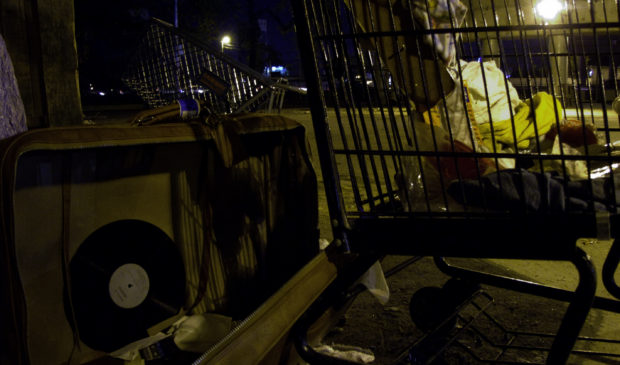Council OKs short contract to clean up homeless camps
Friday, July 31, 2020 by
Jo Clifton Ten people signed up to tell Council on Wednesday they were opposed to awarding a three-year contract to Relief Enterprise of Texas Inc. for “removal of debris and cleanup services under bridge overpasses, under bridges, and in the transportation right of way.” Austinites addressing Council said they had witnessed employees of the contractor acting in a way that was inhumane, destroying sleeping structures and putting tents in the trash.
After hearing from community members, Council asked staff if there were alternatives to the three-year contract, originally written so as not to exceed $1,725,000. But since there were no immediate alternatives for hauling away the tons of trash and debris found under Interstate 35, U.S. Highway 183, MoPac Expressway, Highway 71 and U.S. Highway 290, among others, Council voted instead to give the company a one-year contract for $575,000.
Council Member Greg Casar, who was hoping city departments could immediately start a pilot program with the help of a nonprofit and/or city staff, voted no. Council members Kathie Tovo and Natasha Harper-Madison were not online at the time and did not participate in the vote.
Jamie Connatser, one of the community members who addressed Council, said she had personally witnessed callous behavior during cleanups by the contractor. “They take people’s structures, water bottles, tents, sleeping pads, tarps, and in one case recently they took someone’s bag with their ID in it – and I’m sure this happens all the time. This is just a small part of what I’ve personally witnessed, and in order to advocate and protect the people that do not have houses we need to change the focus.”
She advocated using the city’s Violet Bag program, “a pickup program so that trash can be removed on a voluntary basis. When Relief Enterprise comes through taking people’s things, it’s involuntary. People are telling them not to take certain things, such as metal structures that people are living in, people who do not have the privilege of living in a tent and have built a structure for themselves to sleep under – they have taken those. They have taken them off of poles and put them in the trash.”
Richard Mendoza, director of the Public Works Department, explained that the violet bags only work for small trash items and the program does not have capacity for the tons of debris that must be removed from underpasses.
Other speakers described similar behavior by contractors. Austin Hess told Council that “the abuses of Relief Enterprise and Public Works are well documented,” and that the cleanups operate in a similar manner to the previous camping ban. He said the cleanup crew “takes away people’s survival gear,” ripping tents away from people, particularly those the crew supervisor perceives as being unfriendly to him. Like the other speakers, Hess urged Council members not to vote for the contract.
A memo from the directors of Public Works and Austin Resource Recovery seemed to contradict some of these statements. The memo, which was sent out Wednesday, said, “the cleanings are not intended to remove personal items. Staff do not remove tents or any items left in the provided storage bags. Only items that are considered trash, debris or unsafe are removed.”
The situation has been made more difficult because of Covid-19 and the threat it poses to those working to clean up the underpasses. Kyle Carvell, a spokesman for the Public Works Department, said the city suspended the cleanups in early March and resumed on June 8. The city initially had a contract with another provider, WorkQuest, and Relief Enterprise was its subcontractor. However, WorkQuest opted out of the contract this spring. Relief Enterprise is described as a nonprofit that employs the disabled.
The Zero Waste Advisory Commission recommended that Council approve the contract.
Casar was hoping he could get enough votes to redirect a substantial portion of the contract back to Public Works or Austin Resource Recovery, so they could hire a nonprofit or employees who would treat the residents of the encampments with more respect. However, the directors of both departments indicated that they were not prepared to make such a commitment at this time.
Ken Snipes, the director of Austin Resource Recovery, told Council he had not been anticipating the question about bringing the service in house, which “would be quite a lift,” he said. Snipes indicated that he and Mendoza need time to figure out next steps.
Council Member Ann Kitchen, whose constituents have expressed concern about homeless encampments near their South Austin neighborhoods, asked that staff come back with a report on their progress in reforming the situation every three months.
In the past, the Texas Department of Transportation provided cleaning of underpasses, but in the spring of 2019 TxDOT abruptly announced it would no longer provide the service.
Photo made available through a Creative Commons license.
The Austin Monitor’s work is made possible by donations from the community. Though our reporting covers donors from time to time, we are careful to keep business and editorial efforts separate while maintaining transparency. A complete list of donors is available here, and our code of ethics is explained here.
You're a community leader
And we’re honored you look to us for serious, in-depth news. You know a strong community needs local and dedicated watchdog reporting. We’re here for you and that won’t change. Now will you take the powerful next step and support our nonprofit news organization?









